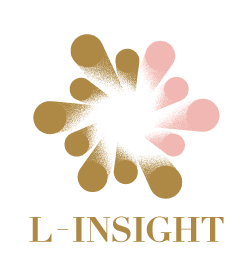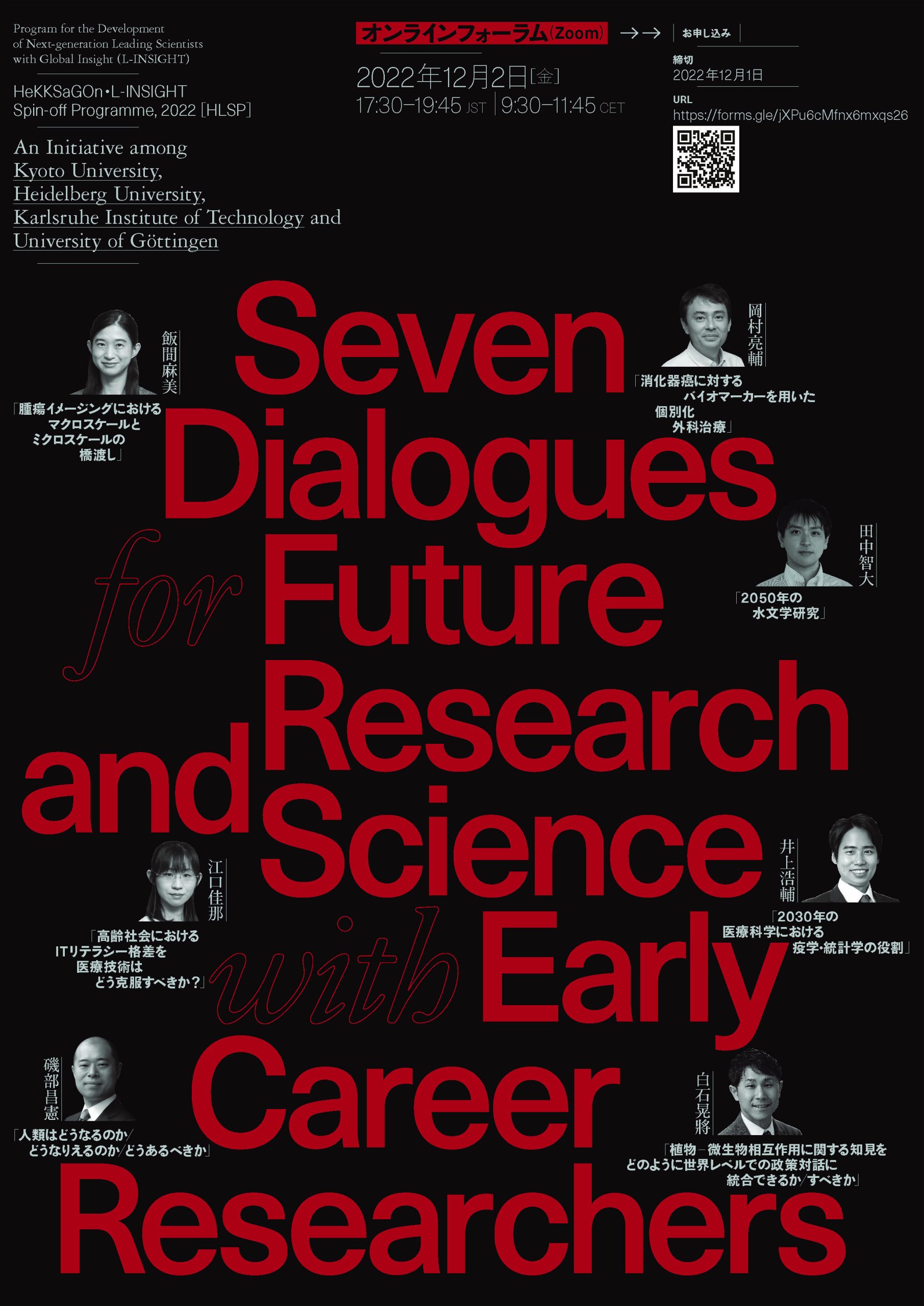登壇者情報更新:【HeKKSaGOn・L-INSIGHT プログラム [HLSP]2022】“Seven Dialogues for Future Research and Science with Early Career Researchers”を開催いたします
本ワークショップでは、次世代の学術を担う研究者が、未来の研究課題のために、今こそ議論すべきだと考える超領域的な7つのテーマを取り上げます。
7つのテーマは京都大学の若手研究者コミュニティであるL-INSIGHTフェローが提案するもので、本年度は、ハイデルベルグ大学、カールスルーエ工科大学の3大学に加え、新たにゲッチンゲン大学の研究者が参集し、それぞれのテーマにわかれて議論します。
この機会は、今年で12年目を迎えるHeKKSaGOn [ ヘキサゴン: 日独6大学アライアンス ] の枠組みにおいて醸成してきた日独大学間の良好な関係性から展開する新たな取り組みでもあります。
とうぞ皆さまも、関心のあるトピックを選んで議論にご参加下さい。国際的かつ分野と世代を超えた議論を通して、将来に向けた新たな繋がりが見つかるかもしれません。
(画像クリックでPDFダウンロードできます)
実施概要
| 日時 | 2022年12月2日(金) Starts at 17:30 (JST) | 9:30 (CET) Close at 19:45 (JST) | 11:45 (CET) |
|---|---|
| 開催方法 | オンライン(Zoom) |
| 対象 | 対話テーマに関心のある研究者、大学生・大学院生、URAなど |
| 参加費 | 無料 |
| 使用言語 | 本プログラムは英語での開催となります。同時通訳はございません。 |
| 申込方法 | 以下のフォームからお申し込みください。 https://forms.gle/jXPu6cMfnx6mxqs26 |
| 申込期限 | 2022年12月1日(木) |
| お問い合わせ | 京都大学 世界視力を備えた次世代トップ研究者育成プログラム(L-INSIGHT)事務室 電話:075-753-5916 メール:admin-l-insight@mail2.adm.kyoto-u.ac.jp |
| 主催 | ハイデルベルク大学 カールスルーエ工科大学 ゲッチンゲン大学 京都大学 |
| 協力 | 京都大学欧州拠点 |
プログラム
開会の挨拶
-
横山美夏
京都大学欧州拠点所長Dr. Klaus Rümmele
Head of International Affairs Business Unit, KIT
パラレルダイアログ
-
Dialogue1
岡村亮輔【 L-INSIGHT fellow 】
京都大学 L-INSIGHT / 医学部附属病院 消化管外科 助教Dr. Johannes Betge (DKFZ)
Translational Gastrointestinal Oncology and Preclinical Models Junior Clinical Cooperation Unit
DKFZDr. Jörg Leupold
Department of Experimental Surgery, Cancer Metastasis, Heidelberg UniversityDr. Nitin Patil
Department of Experimental Surgery, Cancer Metastasis, Heidelberg UniversityProf. Dr. Anne-Christin Hauschild
Department of Medical Informatics University Medical Center Göttingen, University of Göttingen - 消化器癌に対するバイオマーカーを用いた個別化外科治療
Background/Motivation:
Despite the recent development of surgical technology, we unfortunately see postoperative disease recurrence in many of advanced GI cancer cases. We surgeons should know the limits of surgical strategy for controlling tumor spread. How should current precision oncology, such as molecular profiling and biomarker-driven cancer therapy, be combined with surgery to improve GI cancer patients’ outcomes? -
Dialogue2
田中智大【 L-INSIGHT fellow 】
京都大学 L-INSIGHT / 工学研究科 社会基盤工学専攻水工学講座 助教Dr. Simon Schaub
Institute of Political Science, Heidelberg UniversityDr. Guyen Battuvshin
Institute of Geography, Heidelberg UniversityProf. Dr. Martin Sauter
Geoscience Center, University of Goettingen - 2050年の水文学研究
Background/Motivation:
Water sciences, such as hydrology, climatology, limnology, oceanology, coastal engineering, etc., pay the ever-strongest attention to climate change (CC) and its impact assessments. In 1990s and 2000s, CC research in hydrology was simply translating future projected rainfall to the resultant water cycle. Now, this topic became further more sophisticated, including more detailed hydraulic analysis such as inundation, landslides and their translation into economic impacts. The urgent needs of society for climate change adaptation accelerated such studies during this short period. In 2050, when climate change more explicitly emerges, how will or should our hydrological research, especially for CC assessments/adaptation/mitigation go? I would like to discuss the future of hydrology research: more social sciences associated, climate change validation, hydrological modelling, hydrological observation, etc. -
Dialogue3
井上浩輔【 L-INSIGHT fellow 】
京都大学 L-INSIGHT / 医学研究科 社会健康医学系専攻国際保健学講座社会疫学 助教PD Dr. Volker Winkler
Heidelberg Institute of Global Health, Epidemiology of Transition, Heidelberg University HospitalJunior-Prof. Dr. Tim Mathes
Department of Medical Statistics at the University Medical Center GöttingenPelin Ünal
Genomic Epidemiology Group
DKFZTomislav Vlaski
Division of Clinical Epidemiology and Aging
Research
DKFZ - 2030年の医療科学における疫学・統計学の役割
Background/Motivation:
Given the recent rapid advancement of computer science, big data, and machine learning as well as increasing concern over social disparity, what knowledge and skillsets would be appreciated in future science and medicine? What can we do to improve health towards precision medicine (in real meaning)? -
Dialogue4
白石晃將【 L-INSIGHT fellow 】
京都大学 L-INSIGHT / 農学研究科 応用生命科学専攻応用微生物学講座 助教Gideon Bergheim
Centre for Organismal Studies (COS) HeidelbergDr.Islam Khattab
Karlsruhe Institute of Technology, Institute for Biological InterfacesNoemi Flubacher
Botanical Institute, KITProf. Dr. Tobias Erb
Max Planck Institute for Terrestrial Microbiology, Marburg, Germany - 植物-微生物相互作用に関する知見をどのように世界レベルでの政策対話に統合できるか/すべきか
Background/Motivation:
Plant-microbe interaction is a complex, dynamic and continuous process. It has been shown to support plant growth and increase host resistance to pathogens, and the rhizosphere, the underground part, has been the center of the research. Recently, the phyllosphere, the plant leaf surface, has attracted many scientists and phyllosphere microbes have been recognized as important players. New insights have been put into practical applications such as biostimulants for crop yield promotion and plant protection from pathogens. Looking at the accumulating evidence from the perspective of scientific advice for policy-making, the plant-microbe interaction of the rhizosphere has been discussed in international policy dialogues, whereas that of the phyllosphere is stuck in dialogues among researchers. Through some international expert communities, we have started to share new knowledge on phyllosphere microbiology with the expectation to bring the discussion to international policy dialogues for food security and environmental protection. -
Dialogue5
磯部昌憲【 L-INSIGHT fellow 】
京都大学 L-INSIGHT / 医学部附属病院 精神科神経科 助教Dr. Jerome Foo
Dept. Genetic Epidemiology in Psychiatry, Central Institute of Mental Health, Medical Faculty Mannheim, Heidelberg UniversityKelly Amal Dhru, LL.M.
Faculty of Law, Universität HamburgKonrad Waschkies
Department of Psychiatry and Psychotherapy University of GöttingenTuyu Zheng
Department of Pediatric Neuro-Oncology KITZ - 人類はどうなるのか/どうなりえるのか/どうあるべきか
Background/Motivation:
Currently, various state-of-art technics to enhance intellectual ability, such as decoded neurofeedback, have been developed and are now close to be implemented in the clinical field. Careful discussion in advance would be desirable from multiple perspectives as follows; how far the expansion of physical and cognitive functions should go, how far it should be allowed to go, and what kind of common understanding and restrictions are necessary when this expansion proceeds. For example, restrictions have been placed on human cloning, but what extent do such restrictions need to be extended to enhancement of our physical/mental activities? What remains as our individuality? I would like to discuss these issues with people from various fields including those who specialize in bioethics, law, and those who are researching the improvement of cognitive function and recovery of physical function. -
Dialogue6
江口佳那【 L-INSIGHT fellow 】
京都大学 L-INSIGHT / 医学研究科 リアルワールドデータ研究開発講座 特定助教Dr. Nicolai Spicher
Department of Medical Informatics, University Medical Center GöttingenDr. Sebastian Herberger
Interdisciplinary Center of Sleep Medicine Charité-Universitätsmedizin, Berlin - 高齢社会におけるITリテラシー格差を医療技術はどう克服すべきか?
Background/Motivation:
Aging and health now become a worldwide problem. On the basis of WHO’s fact sheets [ref1], the proportion of the world’s population over 60 years will become 22%, while 80% of them will be living in low- or middle-income countries. These situations may cause an ever-greater digital literacy gap, which may even affect access to healthcare or medical service.
At this moment, our study has already faced the digital literacy gap-induced problems in collecting side-effect reports from patients undergoing cancer pharmacotherapy: we confirmed that the use of smartphone applications may become a big hurdle for aged Japanese people. In this dialogue, I would like to first exchange the current situation in Germany and Japan related to the issues surrounding healthcare induced by the digital literacy gap. Then discuss possible issues induced by the digital literacy gap in the future and how we can/should overcome the vicious circle of technology development and the digital literacy gap.
[ref1] https://www.who.int/news-room/fact-sheets/detail/ageing-and-health -
Dialogue7
飯間麻美【 L-INSIGHT fellow 】
京都大学 L-INSIGHT / 医学部附属病院 先端医療研究開発機構・放射線診断科 助教A/Prof. Dr. Dimitrios Karampinos
Experimental Magnetic Resonance Imaging School of Medicine & Munich Institute of Biomedical Engineering Technical University of MunichPD Dr. Sebastian Bickelhaupt
Institute for Radiology
University Hospital ErlangenDr. Felix Kurz
Division of Radiology
DKFZ - 腫瘍イメージングにおけるマクロスケールとミクロスケールの橋渡し
Background/Motivation:
We will aim to establish a trans-scale imaging method that connects a whole body, tissue, and cellular scales using MRI etc, especially diffusion MRI, which can evaluate the movement of water molecules in vivo. In the diagnosis of cancer, it is important to understand the phenomenon and elucidate the mechanism by traversing various scales, such as the tumor microenvironment and micrometastases that may exist throughout the body. However, the understanding of the principles that will lead to the elucidation of new pathological conditions at the microscopic level involving elemental interactions in biomolecules and cells, and at the meso- and macro-level involving tissues and organs, has not yet been fully developed.
The current MRI has difficulty in measuring and evaluating the micro level, especially in terms of resolution, and thus we will aim to develop this method further to establish trans-scale imaging to visualize cancer characteristics on a longitudinal scale and exploit them for cancer diagnosis and prognosis prediction.
全体討論
-
- 各グループでのまとめ(5分×7グループ)
- ゲストからのコメント
コメンテーター
-
Prof. Dr. Thomas Kneib
Dean of research at the Faculty of Business and Economic Sciences, University of GoettingenProf. TANAKA Motomu
Institute for Physical Chemistry, Heidelberg University河野泰之
京都大学 国際戦略本部長・副学長
閉会の挨拶
-
Nicole Dorn
International Relations Division, Department Study Abroad, Exchange Programmes, International Cooperation赤松 明彦
京都大学 次世代研究創成ユニット長/プログラムマネージャー
主催
ハイデルベルク大学
カールスルーエ工科大学
ゲッチンゲン大学
京都大学

